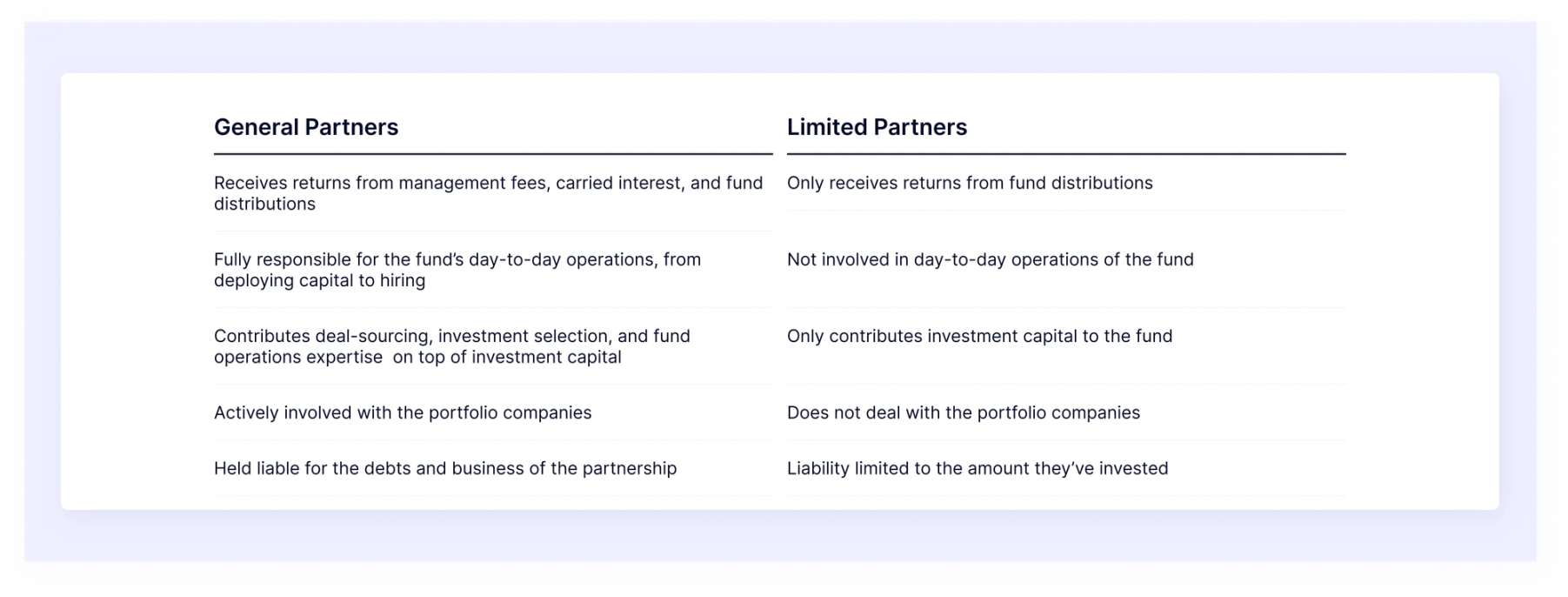
LPs provide the capital for funds to invest. In return, they hope for profits and, in some cases, access to information and future deals.

Limited partners (“LPs”) are critical to the success of venture funds because they provide the capital that funds invest in deals.
LPs often wait years, even a decade or more, to see if the investments made with their capital produce returns. Along the way, they can gain valuable access to the startup ecosystem.
Aside from sending in their money on time, LPs typically carry few other obligations. This arrangement stands in stark contrast to the many roles and responsibilities of a general partner (“GP”) who manages the venture fund.
In this article, we’ll break down what a typical LP does, how they’re different from GPs, how they make money, and more.
Limited partners invest in venture funds.
LPs commit a portion of their capital at the beginning of the venture fund, and the fund manager “calls” on additional capital from LPs as needed. Some GPs might call all capital up front. More commonly, GPs call capital in multiple tranches over a period of years until LPs have fully funded their commitments.
As beneficial owners of the fund, limited partners receive dividends when the fund produces returns, in proportion to how much they invested. Just how much of the fund’s profits they share, and when they get it, is spelled out in their investment documents (more on this later).
Though the economics vary widely from fund to fund, an 80/20 split of the profits of a fund between LPs and GPs is common—with 80% going to the LPs and 20% going to the GP as carried interest.
Here’s an example of how profits might get shared under this scenario: Let’s say you’re the sole LP in a $1M fund. The GP of the fund charges a standard 20% carry, which will get applied to any profits. If the fund returns $3M, then:
For more information on how this works, check out our guide on carried interest .
Depending on how the fund is structured, you often must be an accredited investor or qualified purchaser to become an LP in a venture fund.
To be an accredited investor, an LP must meet one of these requirements:
For an LP to be a qualified purchaser, they must meet the following requirements:
For more background and detail on requirements for investing in venture funds, please see our guide to accredited investors and qualified purchasers .
An LP’s level of involvement in a fund can vary widely from fund to fund. Some GPs do little more than update their LPs on a regular basis, while others engage LPs more actively.
LPs of most any fund have two primary responsibilities:
Failing to send money when a GP makes a capital call can result in penalties to the investor, including a loss of part or all of their investment in the fund, and could hurt an investor’s ability to participate in future funds.
In some funds, a GP might engage their LPs more actively, such as calling for advice from time to time, especially if the LPs have relevant experience. In others, an LP might make introductions to help a company in the fund’s portfolio. In these cases, the LP is usually going above and beyond what’s contractually required of them in their partnership agreement with the fund.
LPs commit to providing capital knowing they may not see any returns at all. They may even lose everything they invest. Venture capital investing is notoriously risky.
If a venture fund does produce returns, it can take 7+ years for those returns to be realized and distributed to LPs. That’s how long it might take a portfolio company to see a so-called “ liquidity event ” (for example, an IPO, acquisition, or share buy-back).
When a fund shares returns with LPs, it’s called a “distribution.” Some funds share distributions at certain milestones (for example, when one of the portfolio companies gets acquired, resulting in a return for the fund). Others may recycle early returns and re-invest the proceeds. The agreements LPs sign spell out those details.
Aside from returns, benefits to becoming an LP might include:

In a venture fund, general partners and limited partners play very different roles.
GPs typically hold fiduciary duties to the fund. Additionally, they’re responsible for:
In addition, GPs typically invest some of their own money into the fund, known as the “GP commitment.”
On the other hand, limited partners provide the capital for the fund but hold few other obligations. Their duties include:
If you decide to become an LP, you’ll want to read and understand all documents you’re provided and follow through on the commitments they spell out.
Typical documents an investor in a venture fund receives include:
GPs often find LPs in their own personal networks, including family, friends, former colleagues, founders and others. LPs can also find and invest into funds and syndicates run by GPs on AngelList. Visit our website to get started.